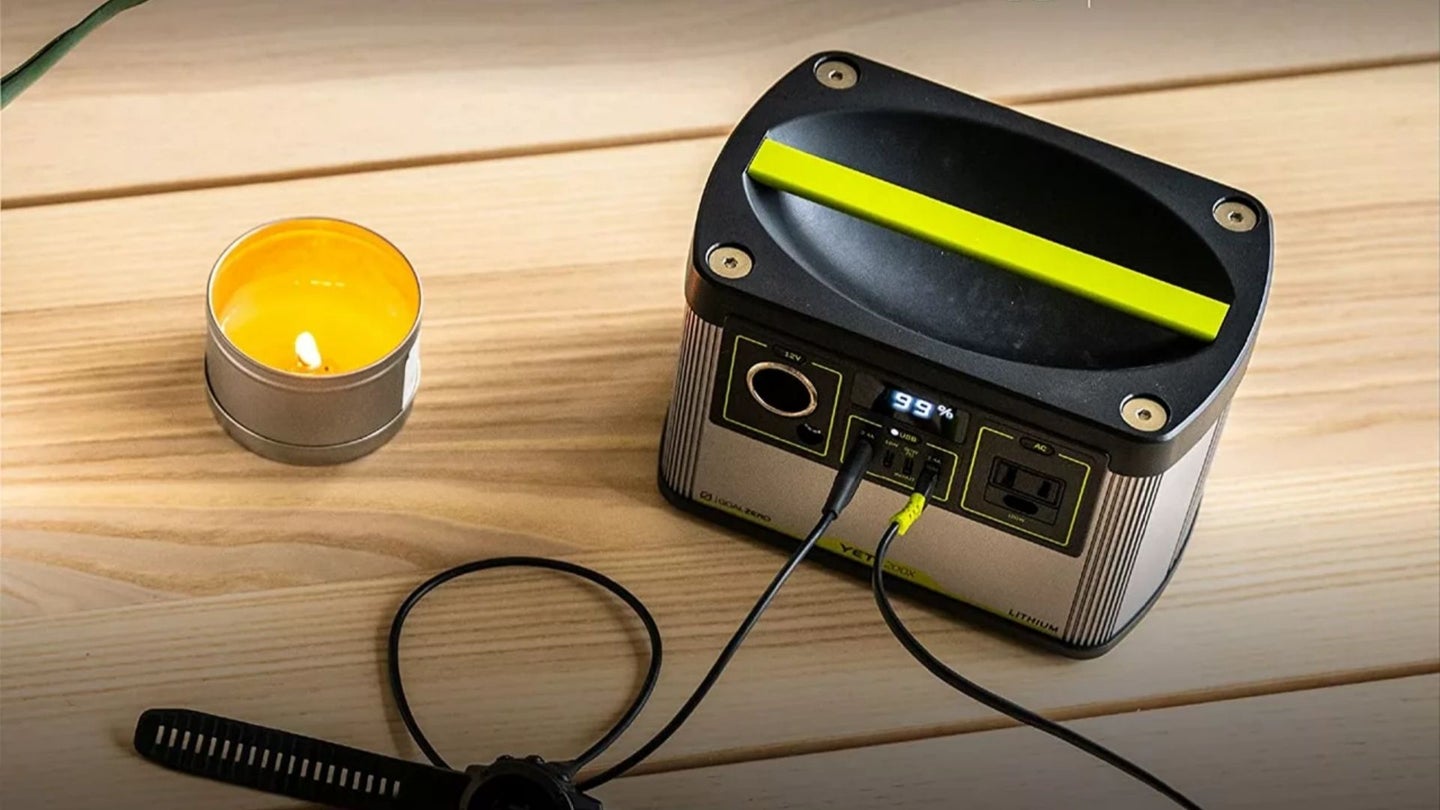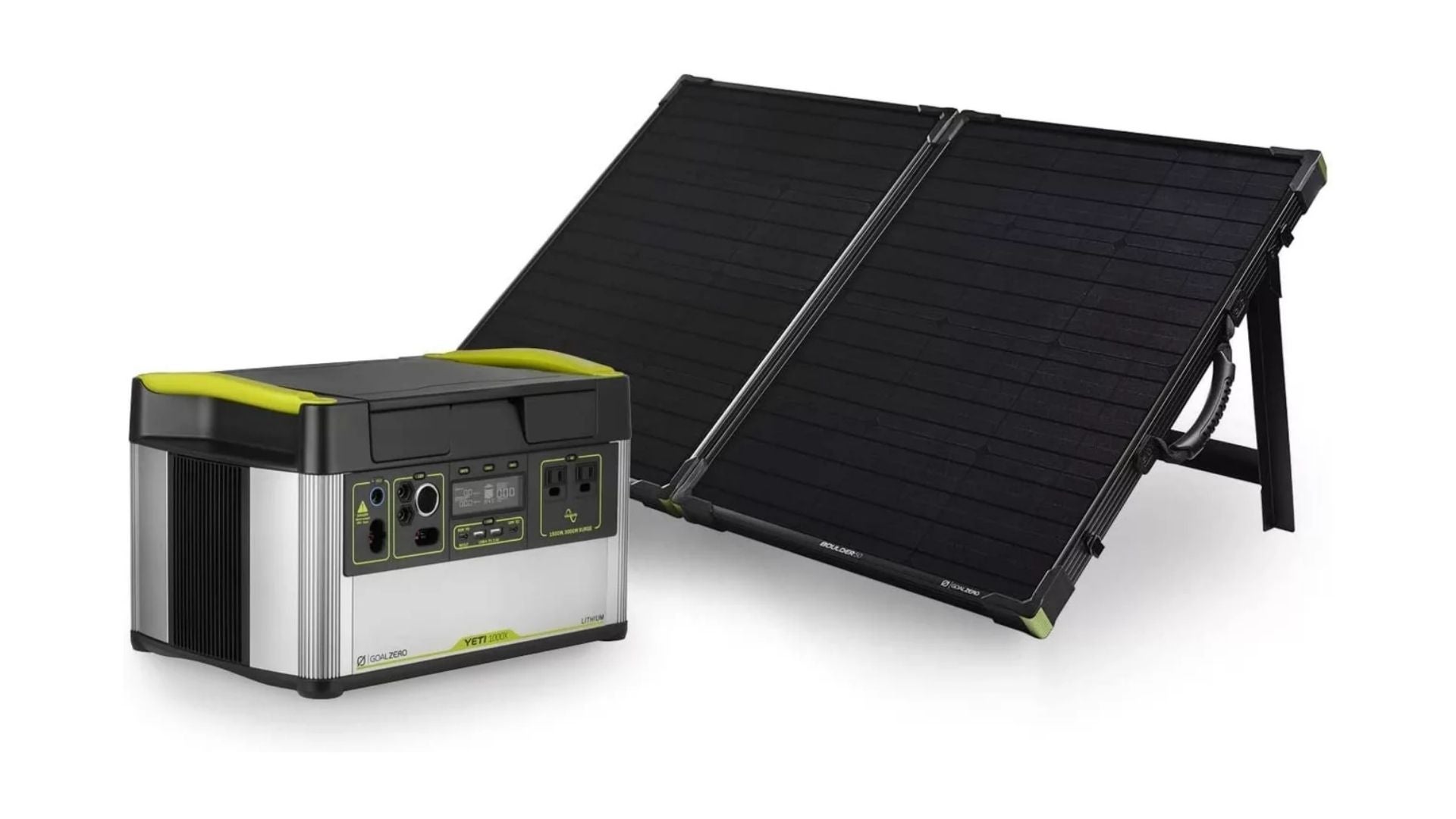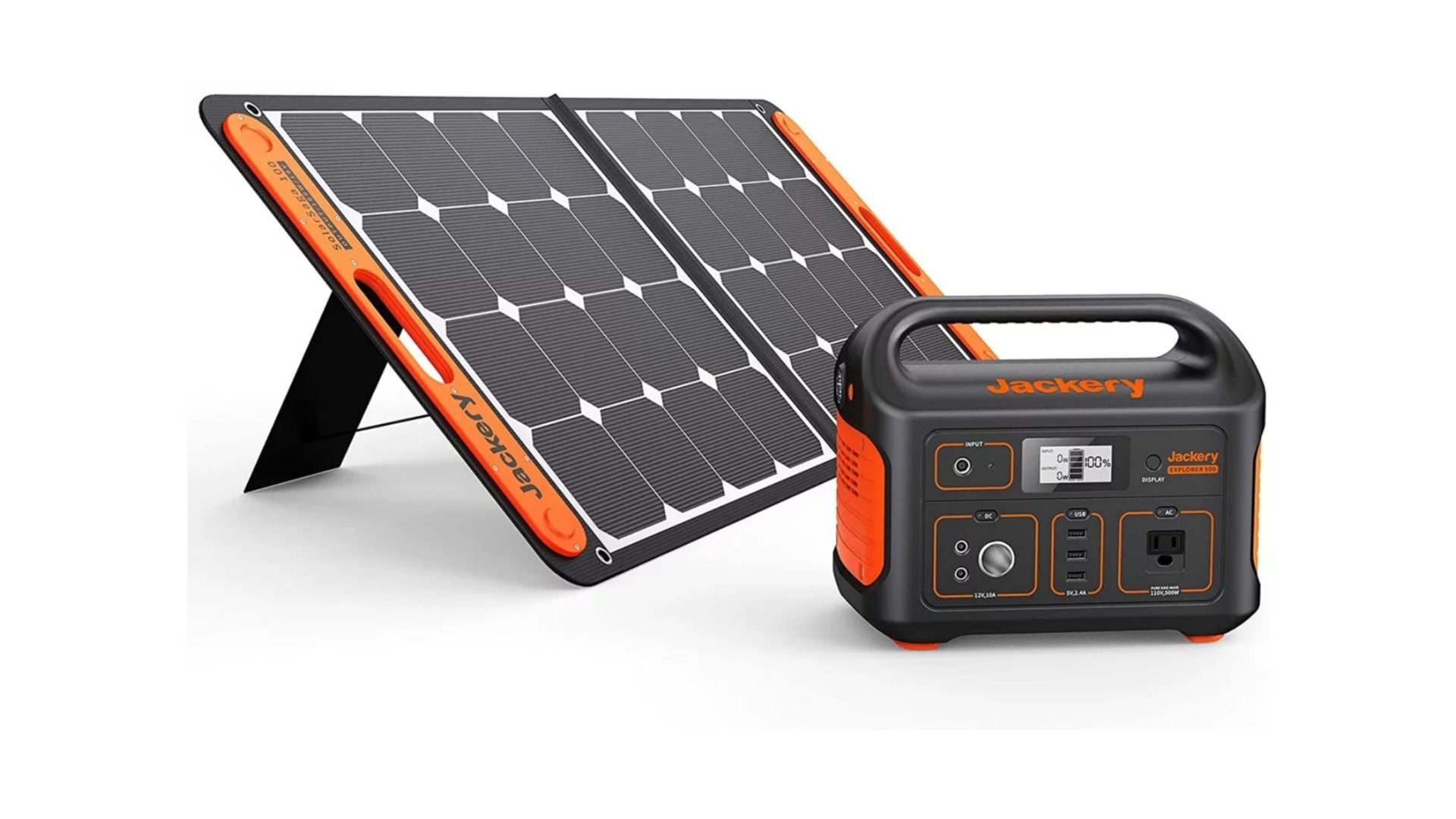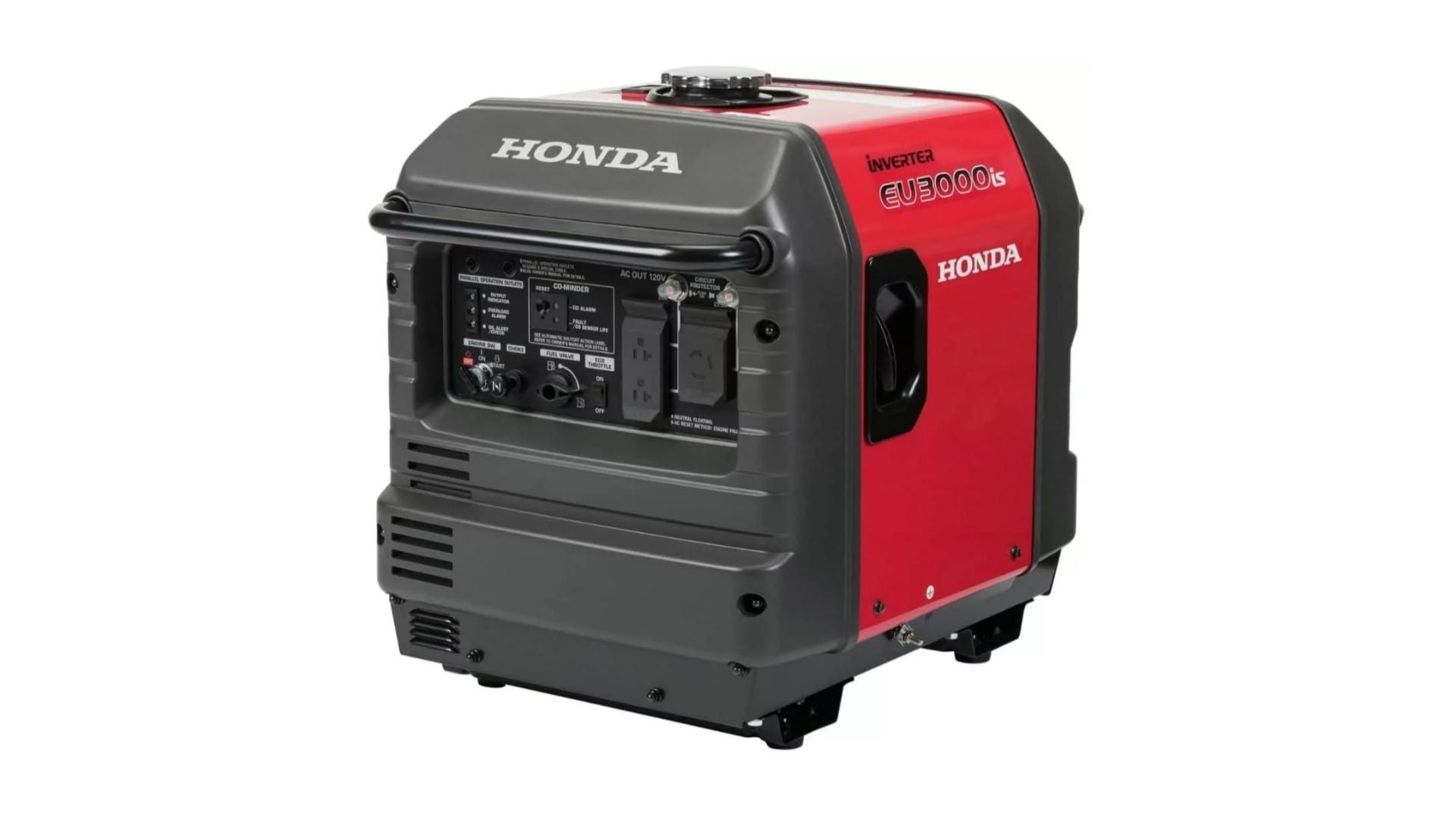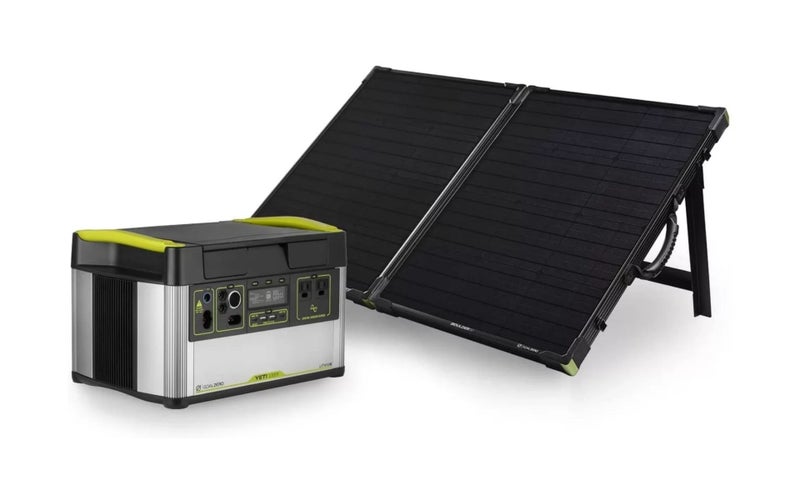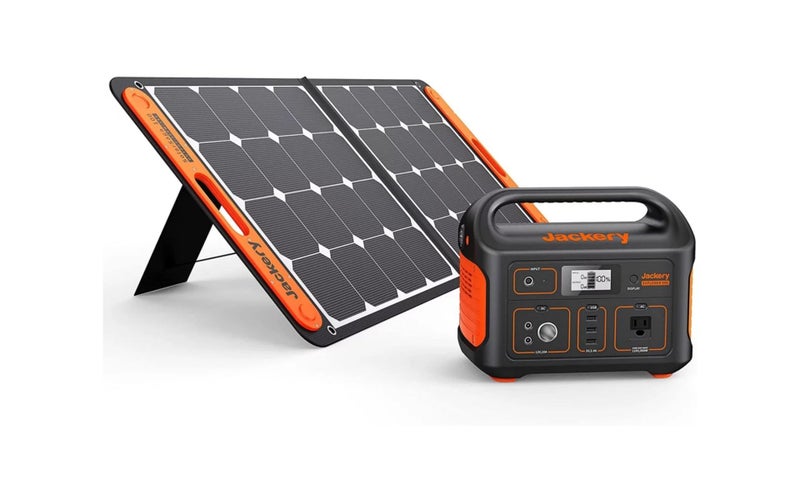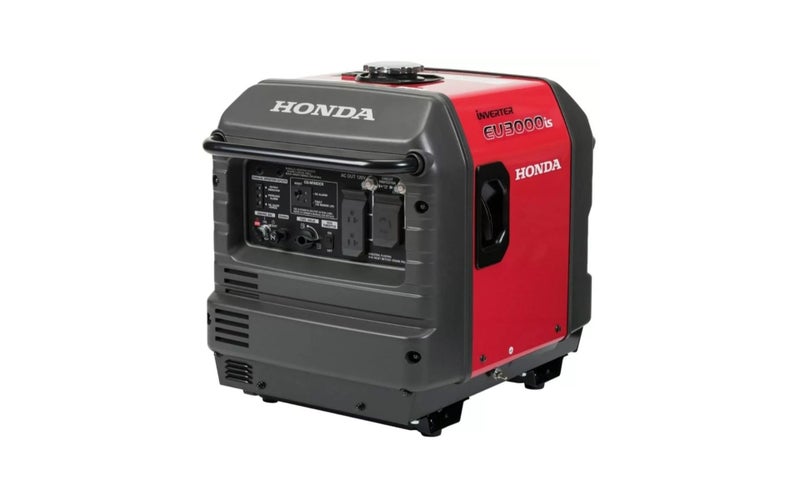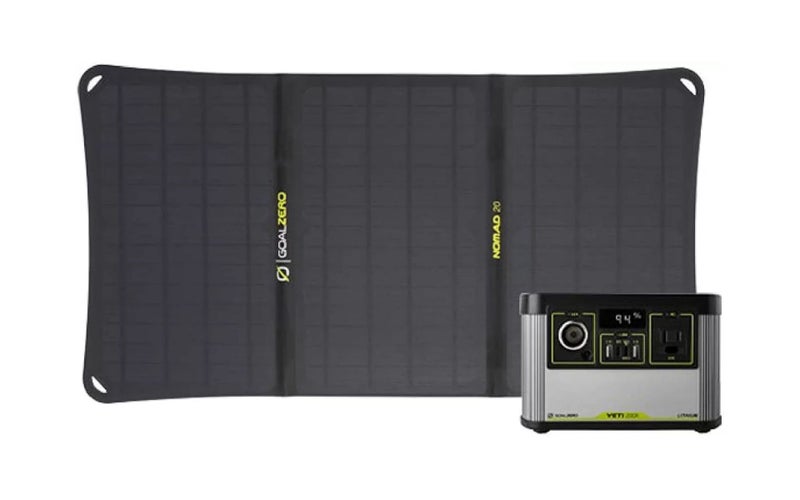We may earn revenue from the products available on this page and participate in affiliate programs.
If you’re looking for a way to make your camping experience feel a little bit less like a field exercise, buying one of the best generators for camping is a huge first step. Instead of cooking dehydrated camping food and having the last song you listened to stuck in your head all night, you’ll have the option to bring fresh food and crank up your favorite playlist.
It’s time to learn what retirees in 40-foot motorhomes have known for decades: Bringing along a little bit of civilization goes a long way. At the very least, a compact camp generator can keep handheld devices powered up for days or more. With a larger generator, you can power refrigerated coolers, space heaters, and electric grills. Your campsite will be a true oasis.
Camping generators have a bonus benefit, too. If everything goes to hell in a handbasket, you’ll have a backup source of electricity to power survival necessities like radios, flashlights, and GPS devices. A big enough gas-powered generator can power your whole house. A solar-powered generator can keep you mission-capable almost indefinitely. So, which one should you choose? I’m glad you asked.
Methodology
I started my market research by considering why people need generators for camping, to begin with. If all we needed to power was a phone and Bluetooth headphones, we’d use a pocket-sized power bank. Campers in the market for a generator probably need enough energy to power larger devices like a laptop, some lighting, and maybe an electric grill — so that’s where my search began. My picks for this list have power capacities from 200 to 3,000 watt-hours.
I researched how different styles of generators work to understand the advantages and disadvantages of fuel-burning and solar-powered generators. I crowd-sourced reviews of popular models and turned to sources ranging from the U.S. Energy Information Administration to Home Depot to understand where our power comes from and how we use it.
I prioritized solar generators because they’re more environmentally friendly, simpler to operate, and don’t constantly consume increasingly expensive fuel. I also focused on manufacturers I know to consistently build quality products. The result is a short but carefully curated list of some of the best generators for camping you can buy right now.
Goal Zero is known for making all kinds of high-end solar products, including what I think is the best camping generator for most people. The Yeti 1000X offers the perfect amount of power and makes serious off-grid adventures possible when paired with Goal Zero’s Boulder 100 solar panel.
If you’re in the market for a camping generator, you can presumably handle a little extra weight and have enough room for rigid solar panels like the Boulder 100. This product collects energy from the sun to keep the Yeti 1000X topped off for extended use off the grid. The Yeti 1000X power station holds 983 watt-hours of electricity, which is enough to power a mini fridge for 14 hours or recharge your phone 83 times. That’s plenty of power for most car campers and overlanders.
At the same time, this setup doesn’t require excessive amounts of space and — with a combined weight of 58 pounds — it’s easy for one person to set up and operate. You’ll have access to eight different kinds of charging ports and outlets and can upgrade your camping generator with all kinds of compatible accessories from Goal Zero. Hopefully, you check out all our other picks, but if you end your search here and buy this one, you’ll be in good hands.
- Storage: 983 watt-hours
- Maximum regulated output: 1,500 watts
- Maximum surge output: 3,000 watts
- Weight: 58 pounds
Power station is weather-resistant; solar panels are waterproof
Charge with your home, car, or the sun
Increase power capacity with expansion batteries
Powerful enough for appliances like refrigerators and microwaves
Solar charging can take up to 24 hours
Briefcase solar panels take up a lot of room
If you like the idea of generating power from the sun rather than hauling jugs of gas into the wilderness, but can’t justify spending $1,600 on the best camping generator overall, the Jackery Explorer 500 and Solar Saga 100 can get you many of the same capabilities at a fraction of the cost.
This relatively small solar generator for camping packs enough power to run devices as small as your phone and as large as a mini cooler. It’s also relatively portable, weighing in at less than 25 pounds. That makes it a compelling option for anyone camping with a smaller vehicle like a UTV or boat. Take your pick from the included AC, DC, and USB charging ports. If you need to keep costs down or aren’t sure if you really need a camping generator, this setup is a great way to test the waters without breaking the bank.
My only word of caution is to do a quick inventory of your electrical needs to make sure this camping generator can produce enough power for you. If it is, you’ll get a hell of a deal on a quality item with a friendly price tag. I also appreciate that this generator makes at least as much power as the name implies (518 watt-hours). If you primarily need to charge handheld devices rather than appliances, this could be a match made in heaven.
- Storage: 518 watt-hours
- Maximum regulated output: 500 watts
- Maximum surge output: 1,000 watts
- Weight: 24 pounds
Great balance of power and portability
Thin solar panels fold in half when not in use
Wide selection of charging ports
One of the most affordable solar generators on the market
Limited ability to power larger appliances
Solar charging takes all day
As much as I love solar generators, there are times when good, old-fashioned gas is still the best source of power. When you need lots of reliable electricity for your campsite or RV, the Honda EU3000is is the best camping generator for the job.
This camping generator has a maximum surge output of 3,000 watts, which is significantly more than the vast majority of solar generators. More impressively, the regulated output is nearly as high, at 2,800 watts. Another big advantage is the time it takes to refill this generator. Instead of waiting all day for solar panels to recharge a battery (assuming you have enough bright sunlight), this generator’s 3.4-gallon tank can be refilled in less than a minute as long as you have enough extra gas. One tank can last as long as 19 hours, thanks to its ability to adjust engine speed to meet power demands.
The downsides of this workhorse are few, but worth considering. First is its fuel consumption. As efficient as the engine is, it still requires you to bring enough gas to produce power for your entire trip. The engine runs fairly quietly, but it’s a far cry from silent solar generators. Finally, this camping generator weighs more than 130 pounds, so don’t plan on moving it by yourself. If those factors don’t bother you, this is one of the best generators for camping with a lot of modern amenities.
- Storage: 3.4 gallons of gasoline
- Maximum regulated output: 2,800 watts
- Maximum surge output: 3,000 watts
- Weight: 131 pounds (dry)
Excellent power output for demanding applications
Get that famous Honda reliability
Refueling is quick and easy with no downtime
Protected by a carbon monoxide sensor and automatic shutoff
Plan ahead and bring enough gas
Too heavy for one person to move
The Jackery Explorer 500 is fairly portable, but this Yeti 200X and Nomad 20 setup from Goal Zero is far more portable for campers who need to cover ground on foot. Altogether, it weighs just seven pounds and is small enough to fit in a backpacking pack.
A simple power bank is adequate for keeping your cell phone charged in the field, but if you have radios, camera gear, and a laptop to charge, this is the perfect way to get the electricity you need without lugging along a full-size power station or gas-powered generator. For comparison, the Yeti 200X holds enough electricity to charge your phone 16 times — most power banks can only offer three or four. It’s also a nice size for car camping, when you just need enough juice to get you through the night without turning to your vehicle for power.
Because of its size, this isn’t advised for larger devices like heaters and refrigerated coolers. It’s designed to fill the gap between power banks and full-size camping generators, and it accomplishes that mission very well. Factor in Goal Zero’s build quality and reputation for withstanding the outdoors, and this is definitely one of the best small generators for camping.
- Storage: 197 watt-hours
- Maximum regulated output: 120 watts
- Maximum surge output: 200 watts
- Weight: 7 pounds
Bridge the gap between power banks and generators
Stay operational as long as you have access to sunlight
Weather-resistant and built for adventure
Monitor charging status with the LED display
Less charging port variety than our other picks
Long charging times from solar panels and wall outlets
Our verdict on generators for camping
The combination of a Goal Zero Yeti 1000X and Boulder 100 is the best generator for camping in most cases. If that’s out of your budget, the Jackery Explorer 500 and SolarSaga 100 offer an affordable entry-level alternative. Did we miss your favorite camping generator? Let us know in the comments section.
What to consider when buying a generator for camping
Camping can take a lot of different forms, so it stands to reason that the best generators for camping come in a variety of shapes and sizes, too. Once you add up your electrical needs with a thorough gear audit, you’ll need to think about how you want to generate and store that amount of power.
Types of generators for camping
Fuel-burning generators
People have been converting combustible fuel into electricity since 1884. Most of us use gas, diesel, and propane to light up our campsites, but coal still provides 22 percent of the electricity in the United States. There are a few reasons fuel-burning generators have stood the test of time. First, combustible fuel is relatively cheap and abundant. For just a few dollars, you can run a gas-powered generator for hours. Refilling your generator’s tank takes a few seconds, and modern internal combustion engines are extremely reliable.
On the other hand, there’s something about venturing into the quiet wilderness and firing up a noisy, exhaust-belching generator that doesn’t sit well with a lot of people. Fuel-burning generators also require you to carry all the fuel you’ll need, which can get heavy and potentially messy. If you need a whole lot of power with little to no downtime, the pros outweigh the cons. Otherwise, the next category might be what you need.
Solar generators
Solar generators are experiencing rapid growth in popularity, partially as a result of technological improvements that are making them more efficient and easier to carry than ever before. Unlike fuel-burning generators, solar-powered energy banks are very quiet or completely silent, produce no emissions, and can draw power directly from the sun. They’re just as popular with environmentally conscious campers and off-grid preppers.
The biggest drawback of solar generators is the amount of time it takes to recharge the battery. Instead of spending a few seconds pouring fuel into a tank, you’ll need several hours of intense sunlight and large, expensive solar panels. If you have plenty of sun and time to wait, a solar generator is probably your best bet for camping.
Power banks
Full-size generators are great for camping trips that involve an overlanding vehicle, RV, or boat, but they’re way too big and heavy for backpacking or carrying into the field for personal use. If you weigh your gear in ounces, a power bank is all you can afford to carry.
For short-term use, the Goal Zero Venture 75 or Anker PowerCore III are ideal. These high-quality power banks can keep your phone and rechargeable flashlight, GPS watch, and other gadgets charged for a few days with mindful battery use. For longer stints in the field, you might want to look at something with an integrated solar panel, like the Blavor solar power bank.
Key features of generators for camping
Power reserve
Generators are classified by their wattage. No matter what a generator’s power source is, you’ll be drawing power from it in the form of an electrical current. Check the devices you plan on using for a label that indicates how much power they draw (both in constant operation and during startup). The total power figure will help guide you toward the right size of camping generator.
In general, portable generators for camping might be rated at 1,000 watt-hours or less. They can be used for smaller devices like your phone, GPS, flashlight, camera equipment, laptop, and Bluetooth speakers. A camping generator rated at 2,000 watts should have enough electricity for power tools, fans, heaters, and lighting. If you want to use high-consumption household appliances like a refrigerator and microwave, look for a generator rated at 6,000 watt-hours or more.
Outlets
All that power has to go somewhere, either in the form of alternating current or direct current. Generators come with a variety of outlets ranging from USB ports to 240-volt outlets, and it’s important to buy one that’s compatible with the devices you want to use.
If you need to power small devices like a phone, flashlight, GPS, and smartwatch, even a compact power bank may be sufficient. Things like camping refrigerators, heaters, and air compressors warrant upgrading to a midsize camping generator with 120-volt outlets and a substantial power supply. Powering an RV will require a 240-volt plug and involve a higher rate of fuel consumption.
Convenience features
There are a lot of manufacturers competing to sell the best generators for camping, and many of them choose to offer value-adding features to make a certain product more marketable. Some of these features might not matter to you, but others could be worth prioritizing.
Look for convenience features like an array of charging docks; 120-volt outlets, 12-volt outlets, and various sizes of USB ports are common. Larger generators for camping at more established campsites may include a 240-volt outlet. Some solar generators can be daisy-chained with additional batteries to increase storage capacity. More modern inverter generators can adjust engine speed to match power demand and reduce fuel consumption.
Generators for camping pricing
Camping generator pricing varies and is primarily dependent on the power capacity. A good sub-500-watt generator will set you back about $400. Most of the best generators for camping offer 1,000 to 2,000 watts and cost around $1,500. Camping generators for RV camping or home backup will cost several thousand dollars. The most expensive generator on this list, the Honda EU3000is costs $2,500.
FAQs about camping generators
You’ve got questions, Task & Purpose has answers.
Q: Why would you need a generator while camping?
A: Generators can power things like refrigerated coolers, grills, lights, fans, and heaters to make your campsite feel more like home. Backpackers will have to make do with a power bank, but car and RV camping can get a serious upgrade from a generator.
Q: What size generator do I need for camping?
A: That depends on how much power you use. Add up the power consumption of each device you plan on plugging in, factor in how much time you’ll be using it, and go from there. Think about how much access you’ll have to fuel or solar energy, too.
Q: What’s the difference between inverter generators and portable generators?
A: Inverter generators are more efficient because they can adjust engine speed depending on electricity demand. Traditional portable generators run at a constant engine speed; that makes them very reliable but loud and thirsty.
